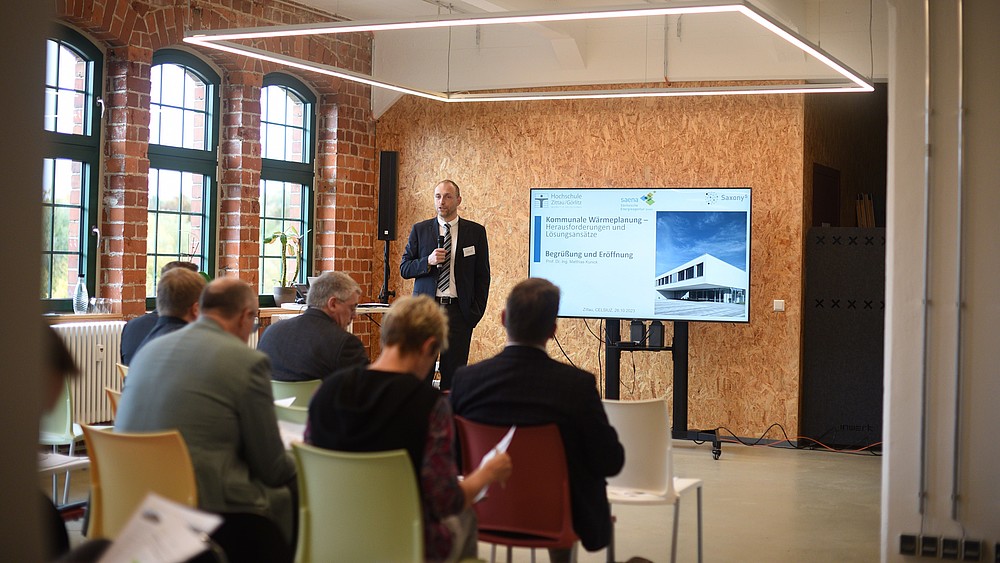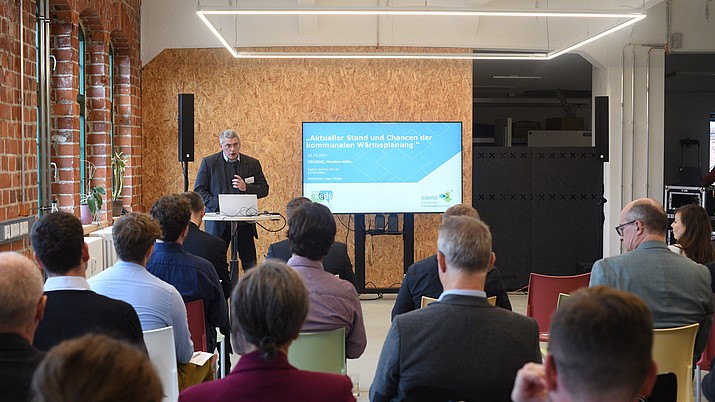HSZG discusses challenges and solutions in municipal heat planning with local authorities, energy suppliers, research and industry representatives.

On October 26, the hybrid information and discussion event "Municipal heat planning - challenges and solutions" took place at CELSIUZ, the transfer laboratory of Zittau/Görlitz University of Applied Sciences. The event marked the start of a series of events that Zittau/Görlitz University of Applied Sciences is planning together with the Saxon Energy Agency - SAENA GmbH, in order to support municipalities in implementing the upcoming mandatory task of heat planning.
For the first time, stakeholders from all trades involved were to come together, address their specific questions and engage in a joint discussion.
Prof. Matthias Kunick from the Zittau/Görlitz University of Applied Sciences, as sub-project manager for the "Energy" transfer field in the Saxony5 joint project, welcomed the almost 60 representatives from municipalities, regional energy suppliers, planning offices, research institutions and business development agencies and introduced the event with an overview of the status of heat supply and the objectives of the Heat Planning Act and the Building Energy Act.
Mr. Uwe Kluge from SAENA (Sächsische Energieagentur GmbH) emphasized the importance of a heat supply strategy that must create planning security for consumers and suppliers in the first keynote speech "Current status and opportunities of municipal heat planning". He explained the requirements for municipal heat planning in detail and highlighted improvements that were incorporated into the legal text between the draft bills. He also described how the Heat Planning Act and the Building Energy Act, which will come into force on 01.01.2024, should work together.

The second keynote speech was given by Mr. Kai Kaufmann, Managing Director of Energie- und Wasserwerke Bautzen GmbH (EWB). Under the title "Municipal heat planning and transformation plan in Bautzen", Mr. Kaufmann discussed the challenges of municipal heat planning from the perspective of a utility company. He made it clear that heat planning under changing legal framework conditions is a continuous process in his company, the aim of which is the secure, economical and climate-friendly supply of heat. Mr. Kaufmann presented the current status of heat supply in Bautzen and explained the available potential. He also pointed out open questions regarding the financing of heat planning and practical implementation.
The keynote speeches were followed by short contributions from representatives of municipalities and energy suppliers, who commented on the current status of municipal heat planning in their municipalities. In addition, research institutions such as the Zittau/Görlitz University of Applied Sciences, the Fraunhofer Institute for Energy Infrastructures and Geothermal Energy (IEG, Zittau) and the Institute of Air Handling and Refrigeration (ILK, Dresden) presented specific support services and technical solutions.
The subsequent discussion and Q&A session was jointly moderated by Prof. Matthias Kunick and Dr. Clemens Schneider from the Fraunhofer IEG. Topics discussed included a possible obligation to connect to heating networks, the scarcity of biogenic fuels and other renewable energy potential, the feasibility of refurbishment measures in existing buildings, the costs of converting the heat supply and the impact on citizens.
The degree of the event was provided by Mr. Armin Verch from SAENA, who informed about "Funding and offers of the service point municipal heat planning". He reiterated that municipalities can give their citizens planning security with heat planning. He also provided information on funding opportunities and tools for municipal heat planning.
A survey on the event shows that the participants are very interested in continuing the format and that the exchange between representatives of municipalities, regional energy suppliers, planning offices, research institutions and business developers helps to find solutions to the challenges of the heating transition.
A follow-up event is planned for March 2024 in Zittau, which will again be jointly organized and held by the Zittau/Görlitz University of Applied Sciences and SAENA.
Prof. Matthias Kunick (Department of Energy System Technology, sub-project manager of the "Energy" transfer field) with the main research areas:
Mareike Schneider (Transfer network project Saxony5, transfer field "Energy"):